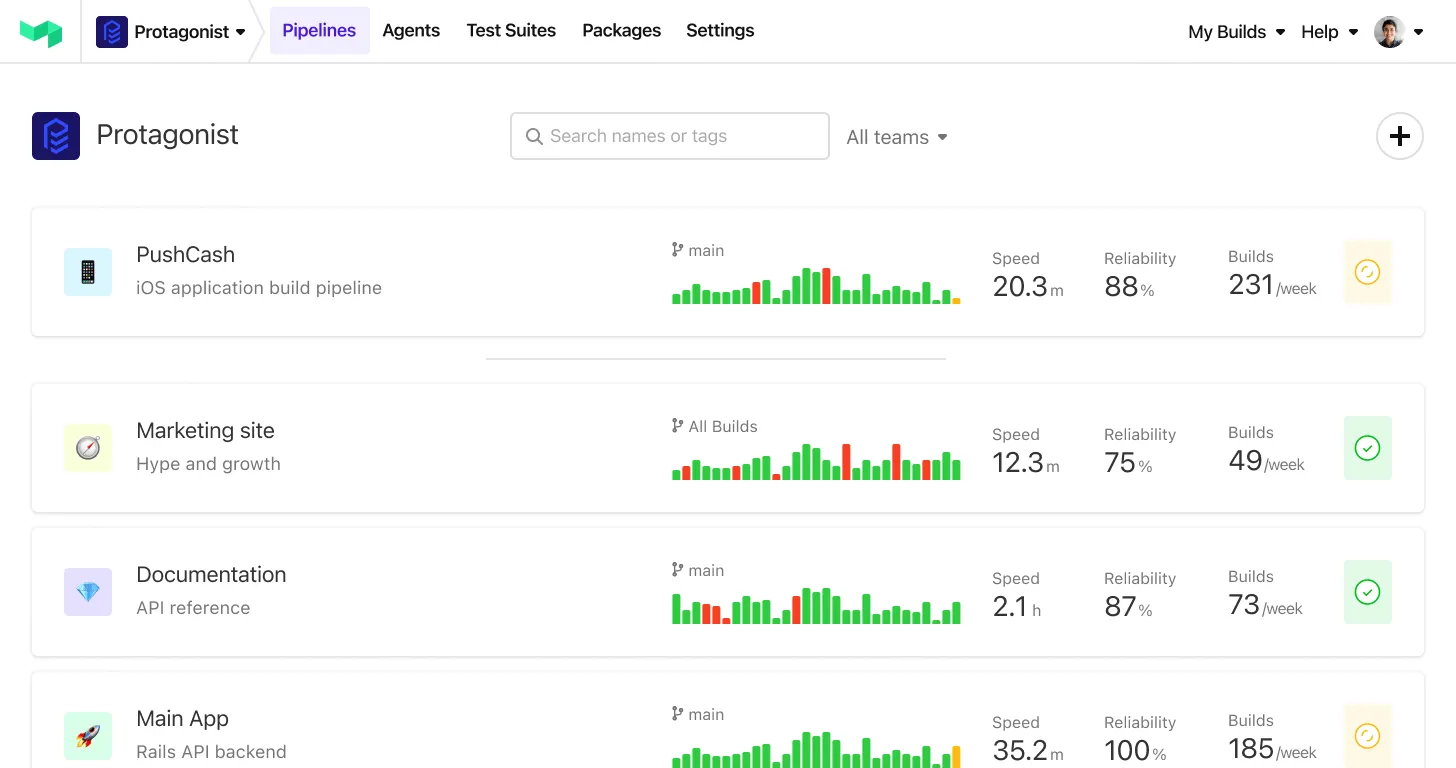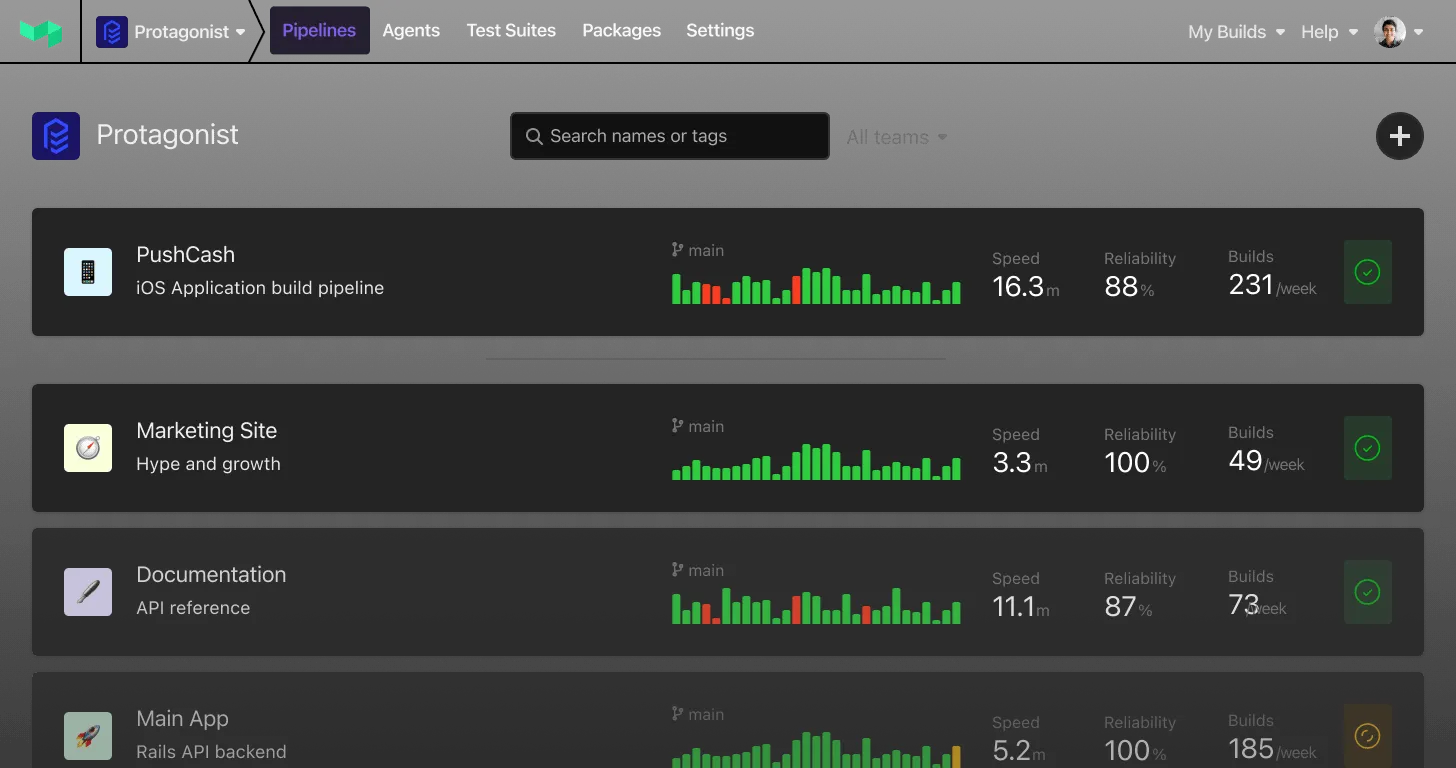Incident PagerDuty Buildkite Plugin
Automatically create PagerDuty incidents when Buildkite builds or jobs fail.
Features
- 🚨 Automatic incident creation when builds or jobs fail
- 🎯 Flexible failure detection - check build status or job status
- 📝 Rich incident details - includes pipeline, branch, build URL, job info, and timestamps
- 🔗 Buildkite annotations - creates annotations with direct links to PagerDuty incidents
- 🔑 Secure credential handling - uses environment variables for integration keys
- ⚙️ Customizable severity levels - critical, error, warning, or info
Required Configuration
integration-key (string)
The PagerDuty integration key for your service. This is a 32-character hex string (e.g., 95ed048753ef450ac065962fdgse1d1c) that routes incidents to the correct service.
If you need to create one, follow PagerDuty’s guide to generate a new integration key. Use your preferred secret management tool to store the key securely.
steps:
# Fetch secrets once for entire pipeline
- label: "🔐 Fetch PagerDuty Credentials"
key: "fetch-pagerduty-secrets"
plugins:
# Choose your secret management solution:
- secrets#v1.0.2: # Buildkite Secrets
env:
PAGERDUTY_INTEGRATION_KEY: your-secret-key
# OR
- vault-secrets#v2.3.1: # HashiCorp Vault
server: "https://my-vault-server"
secrets:
- path: secret/pagerduty/integration-key
field: PAGERDUTY_INTEGRATION_KEY
# OR
- seek-oss/aws-sm#v2.3.3: # AWS Secrets Manager
secrets:
- name: PAGERDUTY_INTEGRATION_KEY
key: pagerduty/integration-key
command: "./run-tests.sh"
Optional Configuration
check (string)
What to check for failures. Options:
job(default) - Create incident when the current job fails (requires acommandin your step)build- Create incident when the build is failing (detects adjacent job failures while jobs are still running)
Default: job
Note:
- The
jobmode requires acommandin your pipeline step because it monitors the command’s exit status. - The
buildmode requires aBUILDKITE_API_TOKENin your pipeline secrets because it monitors the build’s status via the Buildkite API.
severity (string)
PagerDuty incident severity level. Options: critical, error, warning, info
Default: error
dedup-key (string)
Custom deduplication key for the incident. If not provided, a key will be auto-generated based on the pipeline, build number, and job ID.
soft-fail-statuses (string | array)
Exit statuses that should be treated as soft-fail for job-level detection. When the current step exits with one of these statuses (or any status when set to ”*”) , no incident will be created for check: job.
Applies to: check: job only. Build-level detection ignores this setting.
Complete Examples
Job failure detection (check: job)
steps:
- label: "🧪 Tests"
command: "./run-tests.sh"
plugins:
- secrets#v1.0.2:
env:
PAGERDUTY_INTEGRATION_KEY: pagerduty-integration-key
- incident-pagerduty#v1.0.0:
integration-key: "${PAGERDUTY_INTEGRATION_KEY}"
soft-fail-statuses: ["42", "123"] # or "*" for any status
severity: warning
check: jobBuild failure detection (check: build)
Requires
BUILDKITE_API_TOKENto be available in the environment (for example via a secrets plugin).
steps:
- label: "🚀 Deploy"
command: "./deploy.sh"
plugins:
- vault-secrets#v2.3.1:
server: "https://my-vault-server"
secrets:
- path: secret/pagerduty/integration-key
field: PAGERDUTY_INTEGRATION_KEY
- path: secret/buildkite/api-token
field: BUILDKITE_API_TOKEN
- incident-pagerduty#v1.0.0:
integration-key: "${PAGERDUTY_INTEGRATION_KEY}"
dedup-key: "custom-dedup-key-123"
severity: critical
check: buildHow It Works
- Hook Execution: The plugin runs as a
pre-exithook at the end of your job’s lifecycle - Failure Detection: Checks the configured status (job or build) for failures
- Incident Creation: If a failure is detected, sends an event to PagerDuty’s Events API v2
- Annotation: Creates a Buildkite annotation with incident details and a direct link to the PagerDuty incident
Important: Command Requirement
The plugin requires a command in your pipeline step when using check: job mode. This is because the plugin monitors the command’s exit status to detect failures.
Note: If using check: build mode only, a command is technically optional since the plugin only checks build-level status via the API. However, this is an uncommon use case.
Requirements
- Bash
curl(for API calls)- PagerDuty integration key
- Buildkite agent with access to make HTTPS requests to
events.pagerduty.com
Compatibility
| Elastic Stack | Agent Stack K8s | Hosted (Mac) | Hosted (Linux) | Notes |
|---|---|---|---|---|
| ✅ | ✅ | ✅ | ✅ | Requires curl |
- ✅ Fully supported
- ⚠️ Partially supported
- ❌ Not supported
👩💻 Contributing
- Follow the patterns established in the template
- Add tests for new functionality
- Update documentation for any new options
- Ensure shellcheck passes (fix issues, don’t just disable checks)
- Test with the plugin tester
Developing
Run all tests:
docker run -it --rm -v "$PWD:/plugin:ro" buildkite/plugin-testerValidate plugin structure:
docker run -it --rm -v "$PWD:/plugin:ro" buildkite/plugin-linter --id incident-pagerduty --path /pluginRun shellcheck:
shellcheck hooks/* lib/*.bash📜 License
The package is available as open source under the terms of the MIT License.

